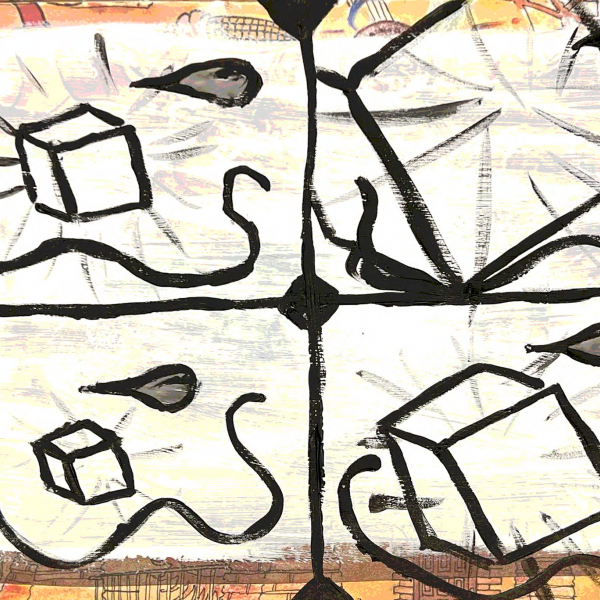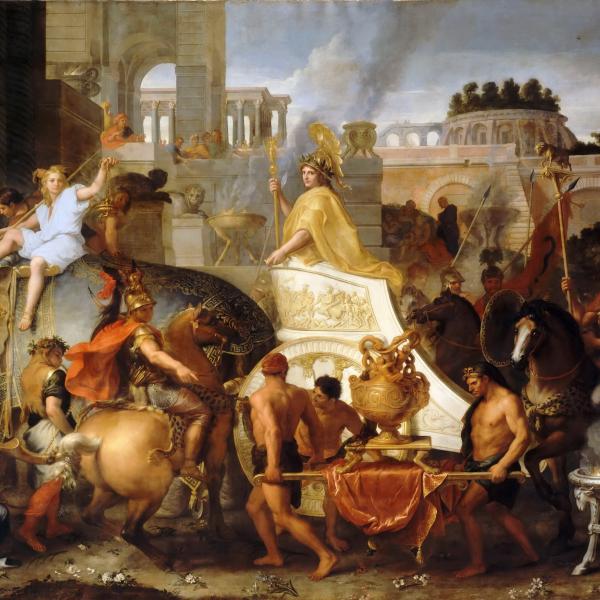By Claire M. Class
Graduate Student, Department of English
In advance of the her March 3 talk, “Pop Prof: The Perils and Possibilities of Public Professing,” Anne Jamison, associate professor of English at the University of Utah and author of Fic: Why Fanfiction Is Taking Over the World, responds to questions from Claire Class, a Graduate Student Fellow in the Center for the Humanities. Based in the English department, Class is also affiliated with the Women, Gender and Sexuality Studies department. Her dissertation is on early-20th-century American sociological reformers. She is planning a second project on women’s science fiction and teaches the class “The Mothership: Reproduction and Parenting in Science Fiction.” Below, we’ve published their email interview.
Claire Class: Fanfiction plays with conventions: It imagines what happens after the marriage plot ends; it shifts a story written in 19th-century realist prose to stream of consciousness; it combines the generic tropes of the Western with those of the writing program memoir. However, fanfiction is more likely to preserve characters. What can fanfiction teach us about what constitutes a character and the role characters play in our stories and our lives?
Anne Jamison: Fanfiction tells us that we have tremendously strong feelings about characters and also reminds us of what we knew as children: It’s not necessarily a passive relationship. We like to mess with characters, take them to different places, fight them or be them (or, as my daughter used to do, feed them sumptuous pasta dinners). But character in fanfic is also surprising. We have come to associate characters so much with unique individuality and specific, fixed portrayals that it is surprising when we see in fanfic how many distinctive characterizations can still be understood as versions of the same character.
How much leeway there is in characterization is fandom specific, but generally there are some characteristics that a story needs to hit. Sherlock Holmes needs to be inquisitive, obsessive, brilliant, hyper-rational and somewhat at odds with social convention. He also probably needs to be tall and striking-looking. He doesn’t need to be a detective, but he needs to devote his mind to some pursuit exhaustively. If he doesn’t have some version of a John Watson, then it is probably a sad story.
There are also what I’d call secondary characteristics, some but not all of which will make up the picture: Sherlock Holmeses can be drug addicted, rude, asexual, emotionally stunted, secretly hypersensitive, depressive, fond of bees, etc. But as long as Holmes is hitting a quorum of these qualities, he can be five years old or a professional pitcher or a sex consultant. He can be gay, straight or any given variety of queer; he can be neuro-nontypical; he can also be she. There’s an interesting comic book version in which he is black and working in Harlem. I doubt, however, he could be blonde, ruddy-faced, easygoing and none-too-bright. One of the most spot-on Holmeses I’ve ever read in terms of Arthur Conan Doyle–style voice and characterization also happens to be a pony.
“Pop Prof: The Perils and Possibilities of Public Professing”
Anne Jamison, Department of English, University of Utah
Thursday, March 3, 5 pm
Danforth University Center, Room 233
Claire Class: Joy is an important marker of fanfiction in Fic. Unlike equally experimental avant-garde writing, you argue, fanfiction has little desire to break fully with the past. Instead, it is about admiration and pleasure. Pleasure is sometimes considered too slippery for academics to talk about. How does fanfiction communicate and engender enthusiasm and joy?
Anne Jamison: Certainly fanfiction tends more to embrace continuity with its sources or with fanfic culture. But more broadly, fanfiction tends to be narrative- and character-driven. Avant-garde literature tends to want to disrupt narrative and character, whereas fanfic wants to play around with them. Fanfic is often about pleasing the writer (“I wanted the scene to go this other way!”), or exploring tensions or possibilities the source couldn’t. So, there is a pleasure of plenitude, of reiteration, but there is also a pleasure of fixing, of giving yourself and other fans what they most wanted that the source withheld (withheld often for reasons of genre, or budget, or novelistic or television serial structure). Sometimes it is the pleasure of correction or revenge. The impulse for writing or reading fanfic it isn’t always happy love and positivity — it can be aggravation or even rage. Still, you wouldn’t get that aggravation and rage without a strong investment. And writing stories or scenes for others who share that same investment, and pleasing them, or causing a strong reaction in them — that’s fun.
Of course academics should talk about pleasure. Why would we trivialize what is so obviously so important to us? Talking about pleasure is complex and messy and varied. I think it got a bad rap somehow as an opiate of the masses, because art should be upsetting people so they want to change their situation — and I’m all for that. But I don’t think that necessarily means that pleasure is apolitical, innocent, impotent or disempowering. It can, of course, be dangerous, but surely that is one of its charms.
Claire Class: Fanfiction suffers from various prestige problems. One of the ways academics have coped with studying low-prestige topics is by eschewing evaluative judgments, yet you are not reluctant to give your opinion on specific fanfictions, particularly if you find them especially good. What marks a fanfiction as particularly good, and why do you feel it’s important to be frank about your opinions?
Anne Jamison: Actually, I’m quite cautions about this. I tend only to make positive evaluative judgments in a professional capacity, I don’t do it that often, and I try to make my criteria clear. I never trash any individual fanfiction. Why would I bother? It’s not as if the world needs my help to find bad fanfic and dismiss or belittle it. And I am mindful that these are amateur writers (even the pros are amateur when they’re writing fic). They are putting themselves and their feelings and their stories out there for free, and they didn’t ask for an English professor’s critique. It’s like trying to clean the kitchen with napalm: It’s overkill and could do a lot of damage.
As a critic, I’m drawn to fics that do things that mainstream published fiction or television can’t do: innovative platform-specific forms, missing moment scenes, very short forms or long, drawn-out assemblages of story with collections of vignettes or “outtakes” alongside them. Various extremes (thematic or otherwise), pairings that would never happen in canon, full-on absurdist treatments, multi-authored pieces, and all of the truly astonishing transformations of gender and sexual identity, disability, and, occasionally though less frequently, race.
I don’t like everything that I find interesting as a critic, and the things I like aren’t necessarily interesting to me as a critic at the level of the individual story — “Oh, hey, here’s another fic about House and Wilson sitting on the sofa watching sports!” But as a collective entity, the existence of that as a genre would be interesting to me. What makes a “good” sports-watching story is something I’d like to think about. I would be interested in it myself, the avid reader of those stories who in real life is not enthralled by men watching televised sports, certainly doesn’t watch them do it — but could find plenty of convenient opportunities to do so. It’s not as if I need fic for that. But I want fic for that.




